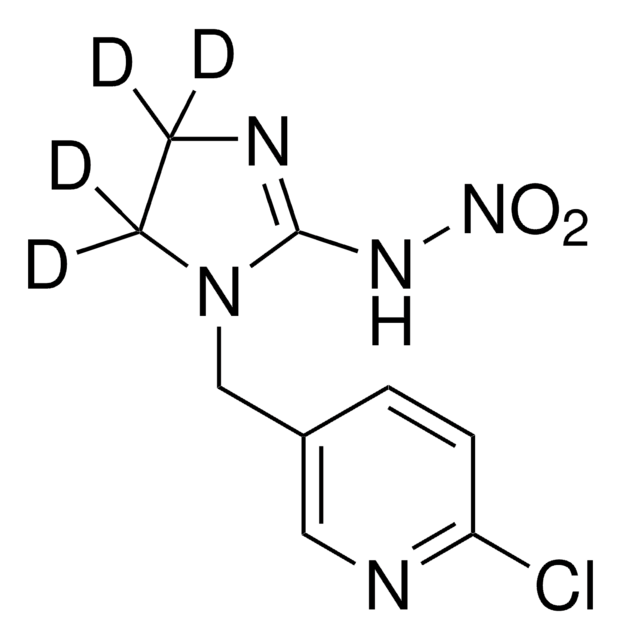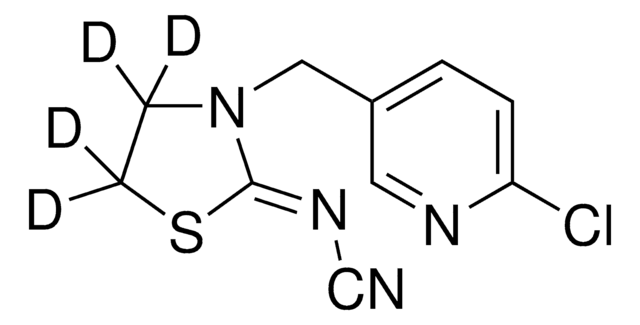51949
Azoxystrobin-(cyanophenoxy-d4)
PESTANAL®, analytical standard
Synonym(s):
Azoxystrobin-d4
Sign Into View Organizational & Contract Pricing
All Photos(1)
About This Item
Empirical Formula (Hill Notation):
C22D4H13N3O5
Molecular Weight:
407.41
UNSPSC Code:
77101502
NACRES:
NA.24
Recommended Products
grade
analytical standard
Quality Level
product line
PESTANAL®
assay
≥98.0% (HPLC)
shelf life
limited shelf life, expiry date on the label
application(s)
agriculture
format
neat
storage temp.
2-8°C
SMILES string
O=C(OC)/C(C1=C(OC2=NC=NC(OC3=C(C#N)C([2H])=C([2H])C([2H])=C3[2H])=C2)C=CC=C1)=C/OC
General description
Azoxystrobin-(cyanophenoxy-d4) is an isotope-labeled analog of azoxystrobin, a systemic fungicide of the strobilurin group, widely used for the control of Plasmopara Viticola and Uncinula in grapes, grey mold in a variety of crops, including vegetables, ornamentals and strawberries.
Application
Isotope-labeled compounds are increasingly used in isotope dilution mass spectrometry (IDMS) for the quantitative analysis of pesticides. The main advantage of using the IDMS technique is because isotope-labeled compounds have nearly the same physical properties as their non-labeled counterpart analog, and thus show identical behavior during the workup and sample preparation process. This helps in overcoming the problems of matrix effects generally encountered in the usual LC-MS/GC-MS analysis potentially resulting in biased results. By spiking the sample before workup with its isotope labeled analog, the loss of analyte that leads to matrix effects can be determined and compensated.
Legal Information
PESTANAL is a registered trademark of Merck KGaA, Darmstadt, Germany
signalword
Danger
hcodes
Hazard Classifications
Acute Tox. 3 Inhalation - Aquatic Acute 1 - Aquatic Chronic 1
Storage Class
6.1C - Combustible acute toxic Cat.3 / toxic compounds or compounds which causing chronic effects
wgk_germany
WGK 3
flash_point_f
Not applicable
flash_point_c
Not applicable
Choose from one of the most recent versions:
Already Own This Product?
Find documentation for the products that you have recently purchased in the Document Library.
Molecular characterization of field azoxystrobin-resistant isolates of Botrytis cinerea
Jiang J, et al.
Pesticide Biochemistry and Physiology, 93(2), 72-76 (2009)
Residues of azoxystrobin from grapes to raisins
Lentza-Rizos C, et al.
Journal of Agricultural and Food Chemistry, 54(1), 138-141 (2006)
Our team of scientists has experience in all areas of research including Life Science, Material Science, Chemical Synthesis, Chromatography, Analytical and many others.
Contact Technical Service










